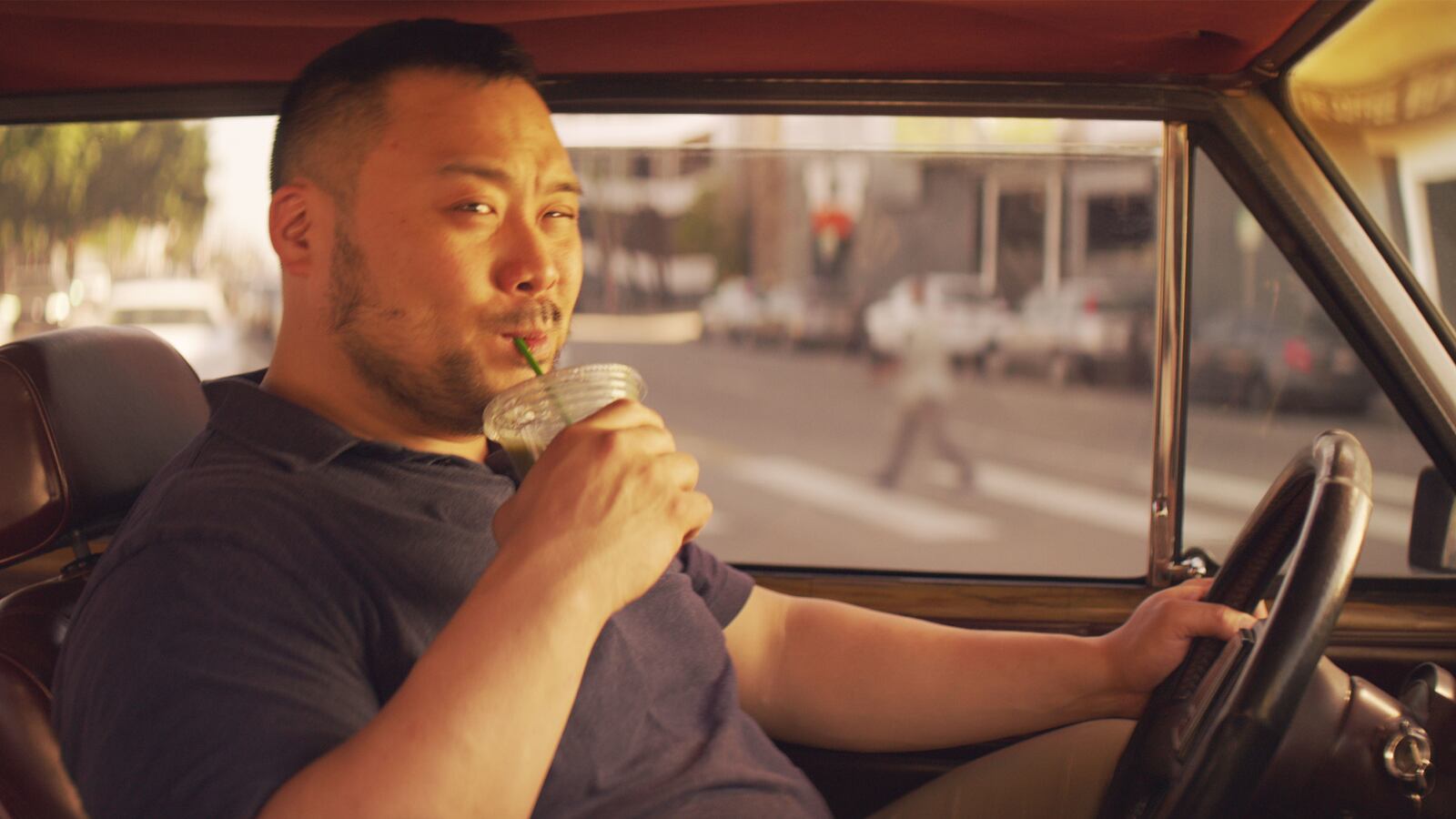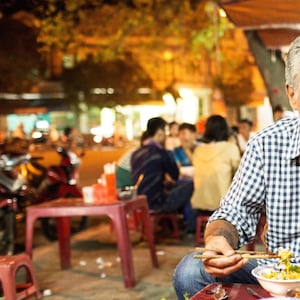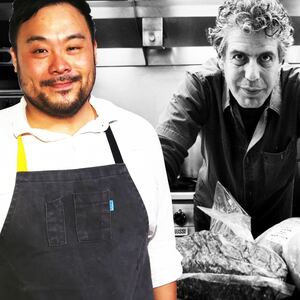Chef David Chang has followed up his overly ambitious Netflix series Ugly Delicious with something exceedingly simple. For his new show, Breakfast, Lunch and Dinner, which is streaming now on Netflix, he spent one full day in four different international cities with four different celebrity friends. The results, like almost all of the food that comes out of his increasingly large number of restaurants around the world, are hard to resist.
Chang smokes weed with Seth Rogen in Vancouver, rides camels with Chrissy Teigen in Marrakech, gets pedicures with Lena Waithe in Los Angeles, and spends a lot of time laughing with Kate McKinnon in Cambodia. And that’s not to mention all of the insanely delicious-looking food that gets devoured along the way.
When I reach Chang by phone the night before Breakfast, Lunch and Dinner hits Netflix, he’s living out of a suitcase in sunny Los Angeles, where he recently opened his excellent restaurant Majordōmo and will be moving with his wife and young son in the near future. “My wife wanted to have our child in New York, but we’ll be back,” he promises.
We talk about how he made the show, “ruining” restaurants by featuring them on TV, what he learned from Anthony Bourdain, how eager he is to get his restaurant group’s unfortunate Trump controversy behind him and a lot more.
So we’re just a few hours away from the launch of your new Netflix show. How are you feeling?
I’m terrified. I’m absolutely terrified. It’s not something I can ever be ready for. It’s weird. It’s weird enough to get a restaurant open and to do this is just different. I’m not sure how I feel about it quite yet. But I’m excited too.
Your last show for Netflix, Ugly Delicious, focused on a different type of food in each episode. For your new show Breakfast, Lunch and Dinner, you bring a celebrity guest to a different city around the world for each episode. Why did you want to shake it up?
I think we just wanted to try something new. Netflix was totally open to the idea. And I think if Ugly Delicious was that discovery of food, then Breakfast, Lunch and Dinner is still about discovery, but maybe in conversation, maybe about the guest. Or maybe about discovering a city, for instance when I go to Marrakech for the first time or a city [like Vancouver] that I’ve been to a few times but don’t really know as well as say, Seth Rogen. And simultaneously use that as an opportunity to learn about our guests. Food, to me, is one of the great ice breakers and it just encourages conversation, particularly good food does. And maybe we can learn something else about these guests that way.
You smoke a joint with Seth Rogen in first few minutes of episode one. Any concerns about being high on camera, what you might say?
[Laughs] For sure, I worry about that when I’m not on camera. So yeah, that was tough, particularly as strong as Seth’s joints are. That’s why there was a one puff rule for every hour or so whenever he rolled a joint. But I knew I was in good hands and it was just a fun time. I actually had a total blast, I think you can see that. Hanging out with Seth Rogen, I still can’t believe that happened that way and that we filmed it. It’s pretty ridiculous.
You eat a lot in all of the episodes, but was that the episode where you ate the most?
One hundred percent. I think we had more food in that episode than in any other episode for sure. Because you don’t see the amount of donuts we ate and the amount of Cantonese BBQ and all the dim sum and all the samosas. And also, some stuff got edited out. We went and got tacos too and I think another place. But honestly, for good reason, a lot of my memory is hazy.
One thing you talk about with Seth Rogen is the idea of “ruining” restaurants by featuring them on your show. Is that something you’ve seen that happen? Because it can obviously go both ways. You can elevate a place and give them all this new business, but you can also cause a place to be overrun with tourists in a way that they don’t want.
Yeah, I think it’s definitely something I’ve had concerns about throughout my career. First and foremost, we want to be very clear with the restaurant owners. You know, this isn’t my full-time job. I still run restaurants. And I think if you tell any restaurant owner, “Hey, this is potentially going to drive business to you," I don’t know if anyone would turn that down. But I hope that the way we present the restaurants, it keeps the riff-raff out and people are able to act on their best behavior.
In some ways, this new show feels like the closest thing you’ve done to what Anthony Bourdain is really famous for doing on his shows. How much were you thinking about him when you shot these?
I mean, the first time I ever did TV was with Tony [on PBS’ Mind of a Chef]. Every time we ever did anything that was TV-oriented, it was always with the understanding or even permission that Tony thought it was OK to do. So to do something like this right after he passed was not easy to do. It’s something that we spoke about a lot. And we wanted to make sure that we weren’t trying to do anything but pay respect and pay homage. Because the fact is that while there were travel series before Tony, anyone that does food or food travel via culture, it owes its DNA to Tony. Because Tony set the bar and paved the way for every single show out there. How do you do a TV show and not realize that it’s happening because Tony and [his production team] ZPZ paved the way for this to happen? Knowing that, we wanted to find different threads and tell a different story. That’s a hard target to reach. I hope people feel that we were more successful than not.
His suicide inspired you to speak out about your experience with depression on your podcast. Why did you want to do that and what kind of feedback did you get?
The reason I did it was, I was in a lot of pain, as were a lot of people who heard the news. You know, I had a lot of emotions and I thought maybe that was the best way—that if I shared my perceived weaknesses and struggles that maybe it would help others. I didn’t think it was an appropriate time to talk about him or my relationship with him and all the things that he meant to me. And I don’t know that I ever will. But I thought maybe by sharing that, it could help someone else out. And I think of all the things that I’ve ever done—like everyone else, I felt like I was on another planet at that time, I don’t know if I would do that today. But I would say, of all the things I’ve ever done, that’s had the widest, most long-lasting impact with people. It’s not something I want to feel good about but it’s a relieving feeling to know that as uncomfortable as it was, it’s given comfort to others that needed it.
You also recently used your podcast to address the uproar over billionaire Trump-backer Stephen Ross, who in addition to owning Equinox and SoulCycle also has a significant stake in your Momofuku restaurant group. You urged him to cancel his Trump fundraiser in the Hamptons, but he didn’t do that. What has the fallout been like for you from that?
I think whatever I’ve said about it has been said. And I’ve got nothing else to say, other than the podcast and what’s already been out there. We’re going to keep on doing what we need to do.
What would you say to someone who doesn’t want to eat at one of your restaurants because they feel like it is indirectly helping to fund Trump’s re-election campaign?
I don’t know how to answer that question right now.
OK. Let’s end on a lighter note. Assuming you make more of the new Netflix show, do you have any dream guests you want to throw out there and where would you want to go with them?
In terms of guests, I honestly haven’t it given it much thought. In terms of places to go, I would like to go to South America, for sure, if we get the chance. I’d like to go to the Philippines if we get the chance. Even some more places in America. Paris would be cool, because I think that’s still a misunderstood city for a lot of tourists. There are a lot of good places and we’ll see what happens!
This interview has been edited and condensed.









